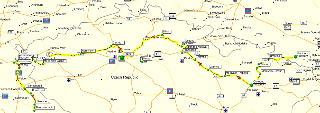The Long March
Besides, the lives of German Prisoners of War in my work in progress, I needed to research British prisoners of war held in Germany. There have been many books and films about this, e.g. The Great Escape and The Wooden Horse, but I needed to find out about what has come to be known as The Long March.

In January 1945 the Russian arm was closing in on many of the British POW camps in Poland and the decision was taken by the German government to evacuate the prisoners westwards. Carrying their belongings, 30,000 prisoners were marched from the camps in groups of 200-300, in the coldest winter for many years, with heavy snow and temperatures down to minutes twenty-five degrees centigrade at times. They were ill equipped for such a march, being weak from poor rations and with inadequate clothing, they could not keep up twenty to forty kilometres a day expected of them.
At the end of each day they were found accommodation in barns, schools, factories and churches where they were supposed to be given food and a hot drink. This was usually barley soup and a hunk of bread and there was never enough of it. The guards were as hungry as the men and were hardly better clothed.
All over Germany there were columns of weary men, shuffling along country roads with little or nothing in the way of food, clothes or medical help. As they grew weaker, they abandoned belongings they could not carry. With so little food, they were reduced to scavenging, some even eating dogs, cats and rats, and digging potatoes from farmers’ fields which had been fertilised with raw sewage, resulting in dysentery. In such conditions it was inevitable that they would succumb to exhaustion and illness. Pneumonia, diphtheria and typhus were rife and frostbite from sleeping on frozen ground. The occasional Red Cross Parcel kept them from actually starving.
There was also the danger of being attacked by Allied bombers mistaking them for marching troops, and sometimes the hostility of the population who would spit or throw stones at them. Not all civilians were like that; some brought a little food and water out to them.
For those who had furthest to come the march lasted from January to April. Thousands died by the wayside. The survivors, in a pitiful condition, finally arrived in the west and were eventually freed by the Allied advance. Large numbers of them had marched over five hundred miles, and some as much as a thousand.
The first prisoners were repatriated by air. Bomber Command began what came to be known as Exodus. Over 3 days from May 4th 1945, they brought back 72,500 prisoners of war.
